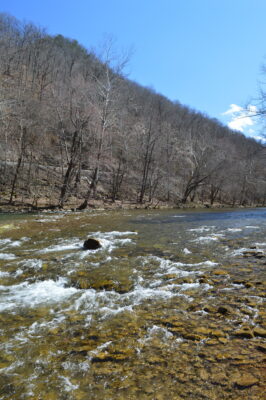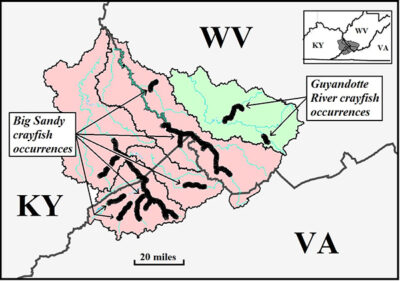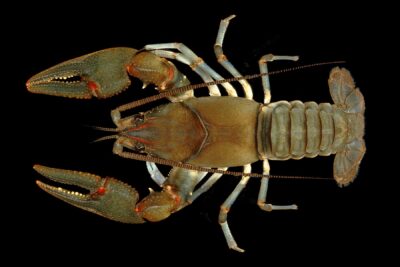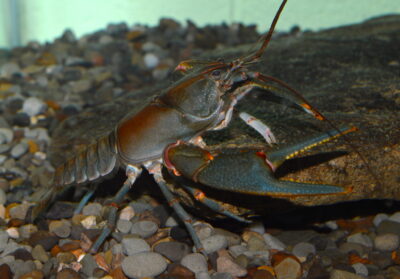Front Porch Blog
Written by Sara Lamb, Appalachian Voices intern. Dac Collins and Willie Dodson contributed to this report.
The U.S. Fish and Wildlife Service is seeking public comments on its proposal to protect approximately 445 stream miles of habitat for two imperiled species of crayfish found only in Virginia, West Virginia and Kentucky. The agency is authorized to make such designations under the Endangered Species Act of 1973.

The Dry Fork stream in McDowell County, West Virginia, supports a Big Sandy crayfish population. Photo courtesy US Fish and Wildlife Service
The Fish and Wildlife Service announced the proposal on January 20 in response to a petition from the Center for Biological Diversity (CBD). The wildlife conservation organization originally filed the petition in April 2016 and argued that surface mining for coal threatened to wipe out the two species.
“Mountaintop-removal coal mining is ruining the water — both for wildlife and for people,” said CBD biologist Tierra Curry. “If we protect streams for the crayfish, then we’ll also be protecting public health and water for drinking, swimming and fishing.”
Take action today! Help protect Appalachian streams!
While mining companies and other entities could already be subject to lawsuits for harming these species, the designation of protected habitat would require any federally funded or permit project to consult with the Fish and Wildlife Service before beginning operations.
“In addition to sedimentation from logging and surface mining, long stretches of streambeds in Virginia’s portion of the Big Sandy Watershed are now used as ATV routes within the Spearhead Trails system,” said Wally Smith, a conservation biologist and Vice President of the Clinch Coalition, a public lands advocacy organization in Southwest Virginia. “These proposed habitat protections will provide an extra layer of accountability for how public funds are used to support recreational development like Spearhead and other ATV trail systems, in the future.”
The Big Sandy crayfish was first identified as being in need of federal protection in 1991. In 2010, CBD, the Clinch Coalition and other regional allies petitioned to protect them as an endangered species. The Guyandotte River crayfish is one of the most endangered crayfish species in America, with its habitat now limited to Wyoming County, W.Va., as a result of the sedimentation of streams caused by coal mining.“I support habitat protections for the crayfish of the Big Sandy River, or Michechobekasepe, as it was and is called by Shawnee water protectors,” said Tiffany Pyette, an indigenous activist from Eastern Kentucky. “In addition to protecting and preserving the lives of this rare and unique species, habitat protections would protect our waterways from further harm. Both of the tribes who had territory on the Big Sandy River regarded it as a river of medicine. Water is a healer and I welcome any opportunity to bring some healing back to it.”
The proposed protected areas are in close proximity to 192 active coal mines, many of which utilize mountaintop removal and other forms of surface mining that commonly release silt and chemical effluents into nearby creeks and rivers. Crayfish are particularly intolerant of poor water quality because they rely on delicate, feather-like gills that act as ultra-fine filters. Higher levels of silt can clog these gills and cause the crayfish to slowly suffocate.
Extinction of these species could bear ecological, cultural, and even economic impacts throughout the Big Sandy and Guyandotte River watersheds, as these crayfish are a primary food source for trout and smallmouth bass, two native species that are highly desired by anglers.

If finalized, the habitat protections would require all projects within the protected watersheds that are federally funded, or subject to federal permitting (like coal mines), to consult with the Fish and Wildlife Service and abide by the agency’s directives on whether and how a given project may proceed without jeopardizing these species.
“Crayfish are a ‘canary in the coal mine’ for the health of streams, and protecting their habitat ensures that we will also be protecting other aquatic wildlife and the communities that depend on these same streams as a source of clean water,” said Smith of the Clinch Coalition. “We hope that regional citizens will make their voices heard by encouraging the U.S. Fish and Wildlife Service to enact these protections and by standing up for the responsible use of waterways in their communities.”
PREVIOUS
NEXT
Related News

Leave a comment
Your email address will not be published. Required fields are marked *



Leave a Comment